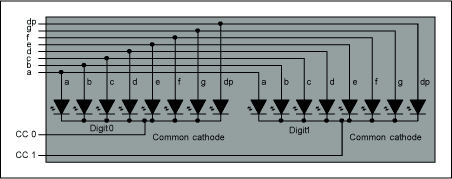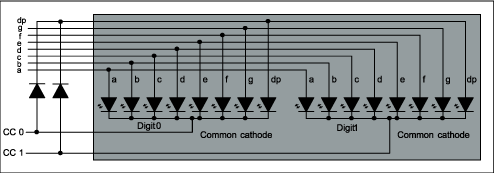This applicaTIon note discusses how to connect the MAX6950 and MAX6951 7-segment LED display drivers to mulTIplex type (internally communed) dual digit displays, instead of regular single digit displays.
The MAX6950 and MAX6951 are five-digit and eight-digit common-cathode LED display drivers that use an unusual multiplexing scheme. This multiplexing scheme minimizes the connections between the driver and the LED display, but requires the segment connections to be different to each of the five (MAX6950) or eight (MAX6951) digits (Table 1).
Table 1. Standard Driver Connections to Single-Digit Displays
Pin 6
Pin 5
Pin 4
Pin 3
Pin 14
Pin 13
Pin 12
Pin 11
Pin 10
*These digits are not available for the MAX6950.
The MAX6950 and MAX6951 were intended to drive single-digit displays, and this allows the segments for each digit to be routed to the correct driver pin. Many dual-digit displays pin out the two digits separately, treating the digits as two singles in one package. These can be driven directly by the MAX6950 and MAX6951. Other dual-digit displays internally pair the segment anodes for the two digits (Figure 1) and these displays present issues.

Figure 1. Internal connections for a multiplex dual-digit display.
The problem can be understood by checking the SEG dp entries in Table 1 for Digit 0 and Digit 1. SEG dp is connected to a different pin for each digit. However, a multiplex dual-digit display commons these connections internally (Figure 1), effectively shorting Pin 5 and Pin 6 of the driver.
Two simple solutions are presented here.
The first solution simply sacrifices the segment drive that share a cathode drive for each dual-digit. This is SEG dp for Digit 0 and Digit 1 discussed earlier. By examining Table 1, it can be seen that the other sacrificed segments are SEG f for Digit 2 and Digit 3, SEG d for Digit 4 and Digit 5, and SEG b for Digit 6 and Digit 7. However, it's usually the DP segments that applications can sacrifice, not segments within the seven-segment digit.
If the DPs are not required, then the connections shown in Table 2 can be used. This is a rework of the standard connections shown in Table 1, with the segments moved so that all segments apart from the DP segments are available. The DP segment connections on the displays are simply left unused. The no-decode operation should not be selected when this (or any other nonstandard) pin mapping is used. The MAX6950 or MAX6951's internal hexadecimal fonts display correctly in decode mode only when the standard display connections are being used.
Table 2. Example Driver Connections to Dual-Digit Displays When No DPs Are Required
Pin 6
Pin 5
Pin 4
Pin 3
Pin 14
Pin 13
Pin 12
Pin 11
Pin 10
*These digits are not available for the MAX6950.
The unused segment drives in the Table 2 connection need not be wasted. They can be used to drive up to 8 discrete LEDs, to take place of each unused dp segment per digit. This is shown in Table 3.
Table 3. Example Driver Connections to Dual-Digit Displays When No DPs Are Required, Plus 8 Discrete LEDs
Pin 6
Pin 5
Pin 4
Pin 3
Pin 14
Pin 13
Pin 12
Pin 11
Pin 10
*These digits are not available for the MAX6950.
The second solution can be used if all digits' segments are required. This time, hexadecimal-decode operation can be selected because the standard segment connection pattern is used (Table 4). The penalty for this configuration is that one diode is required per digit (Figure 2). Each diode is passing only one segment's current, so it can be a low-cost single signal diode like 1N4148, BAS16 (silicon), or BAT54, BAR43 (Schottky). Better still, use surface mount dual common-cathode diodes like BAV70 (silicon) and BAT54C (Schottky). The minimum supply voltage to the MAX6950/MAX6951 must also be raised by the selected diode's forward voltage drop: typically 1.0V for a silicon signal diode or 0.4V for a Schottky signal diode at 50mA.

Figure 2. External connections to modify a dual-digit display so that all segments are available.
Figure 2 shows the correct wiring to the dual-digit used as Digit 0 and Digit 1, which uses external diodes in series with the dp segments. The connections shown in Table 4 show which segments require diodes for the other three dual-digits.
Table 4. Driver Connections to Dual-Digit Displays When All Segments Are Required
Pin 6
Pin 5
Pin 4
Pin 3
Pin 14
Pin 13
Pin 12
Pin 11
Pin 10
*These digits are not available for the MAX6950.